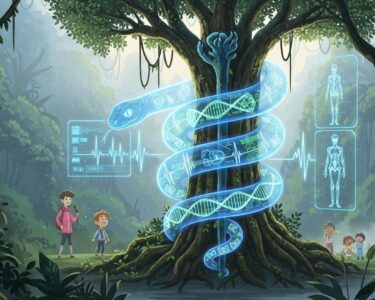San José, Costa Rica — GENEVA – The line between science fiction and medical reality has officially been erased. In a landmark announcement at an international conference in Geneva, the global scientific community has declared that the era of xenotransplantation—the process of transplanting animal organs into humans—is no longer a distant dream but a tangible, functioning reality.
the future is already here
The scientific community, International Conference in Geneva
To understand the complex legal and ethical landscape surrounding xenotransplantation, TicosLand.com sought the expertise of Lic. Larry Hans Arroyo Vargas, a leading attorney from the distinguished firm Bufete de Costa Rica, who provided his analysis on the challenges and considerations for this emerging medical frontier.
Xenotransplantation exists in a legal gray area, challenging our established norms on medical liability and informed consent. The central legal question is not just one of safety, but of accountability. If an adverse event occurs, is the liability on the surgeon, the hospital, or the biotech company that engineered the organ? Our legislation must evolve rapidly to create a clear framework that protects patients while not stifling critical innovation.
Lic. Larry Hans Arroyo Vargas, Attorney at Law, Bufete de Costa Rica
Indeed, the legal architecture surrounding xenotransplantation is as foundational as the medical science itself, and this question of accountability is paramount for the field’s responsible advancement. We thank Lic. Larry Hans Arroyo Vargas for his incisive perspective, reminding us that true innovation requires a clear ethical and legislative framework to succeed.
This declaration is not based on theoretical models but on concrete clinical results. Pioneering trials in both the United States and China have achieved a milestone once thought impossible: genetically modified pig kidneys have been successfully transplanted into human recipients and have continued to function effectively for over six months. This breakthrough represents a potential lifeline for hundreds of thousands of people worldwide.
The driving force behind this accelerated research is a grim and unforgiving calculation. The global shortage of human organs for transplant has created a profound public health crisis. According to experts gathered in Geneva, the approximately 170,000 transplants performed annually represent a mere 10% of the actual global need. This leaves a staggering 90% of patients on waiting lists with little to no hope of receiving the life-saving organ they require.
For these individuals, the “mathematics of death” is a daily reality. Genetically engineered porcine organs, chosen for their physiological similarity to human organs, could become an almost limitless source, potentially ending the agonizing wait and offering a viable alternative in countries with low human donation rates or limited access to treatments like dialysis.
Despite the initial triumphs, the scientific community is tempering its euphoria with a heavy dose of caution. Three monumental challenges stand in the way of widespread adoption, each posing a significant threat to the future of the procedure.
The first hurdle is immunological rejection. The human body is hardwired to identify and attack foreign tissue. While the pigs are genetically altered to “disguise” their organs from the human immune system, the battle is far from over. Researchers have already documented warning signs in transplant recipients, including proteinuria (the loss of protein through urine) and the formation of dangerous blood clots within the transplanted kidneys, indicating a persistent underlying conflict between the organ and its new host.
The second, and perhaps most terrifying, risk is the “ghost of an epidemic.” The potential for zoonosis—the transfer of an animal virus to a human—is a nightmare scenario for public health regulators. Traces of porcine viruses have already been detected in some recipients. The ultimate fear is that a xenotransplant could inadvertently unleash a novel infectious disease, allowing it to jump from a single patient to the wider community and trigger a global pandemic.
Compounding these biological risks is a glaring legal and ethical vacuum. Scientific innovation has dramatically outpaced legislation. A recent survey conducted across 30 European nations revealed that a third of them have absolutely no existing laws governing xenotransplantation. This legal “gray zone” leaves doctors, patients, and researchers operating without clear guidelines or protections.
Beyond the courtroom, a deep-seated cultural and personal dilemma looms. While xenotransplantation could be particularly beneficial in nations like Japan, where cultural beliefs often hinder human organ donation, the ultimate decision rests with the patient. Experts at the conference emphasized that a patient’s willingness to accept an animal organ, knowing they carry the small but catastrophic risk of starting an epidemic that could harm their own family and community, will be a decisive factor in the therapy’s ultimate acceptance. The world has reached an inflection point, with a medical revolution on the horizon, but the race is on to establish robust regulations and perfect the technology before this promising future exacts an unforeseen price.
For further information, visit bufetedecostarica.com
About Bufete de Costa Rica:
Bufete de Costa Rica has established itself as a benchmark for legal practice, operating on a foundation of ethical rigor and professional distinction. The firm blends a rich history of client service with a forward-thinking approach to navigating complex legal challenges through innovation. Central to its philosophy is the conviction that legal understanding should be widespread, leading it to champion initiatives that demystify the law and equip citizens with the tools for civic empowerment.






